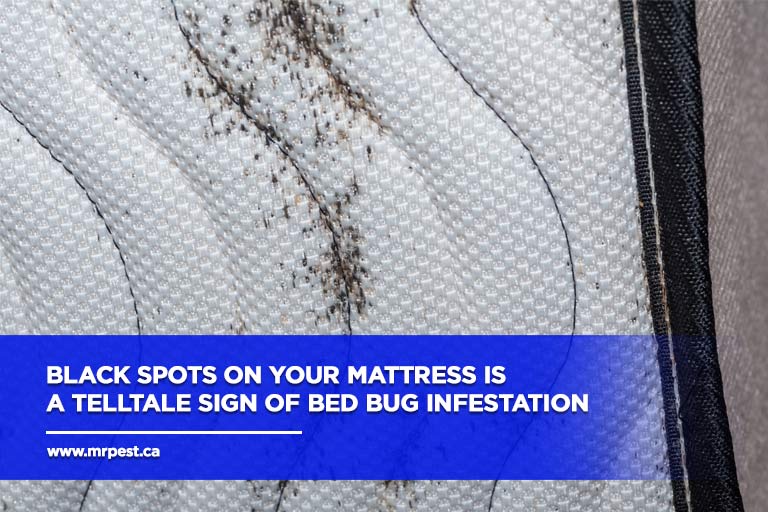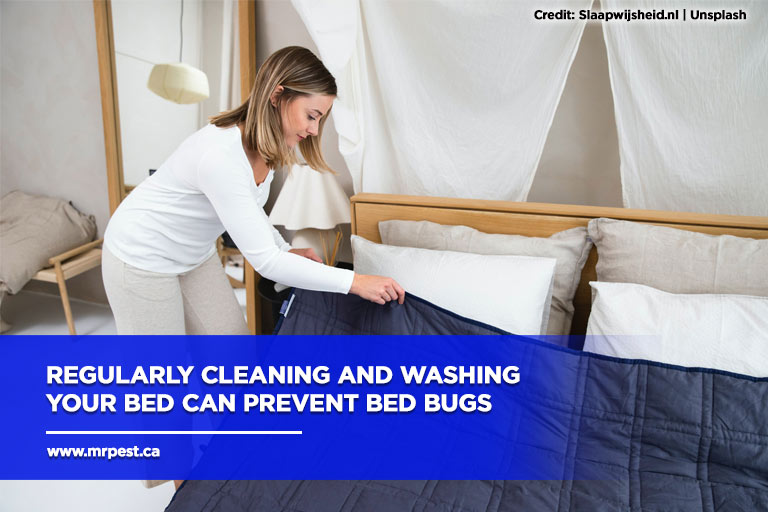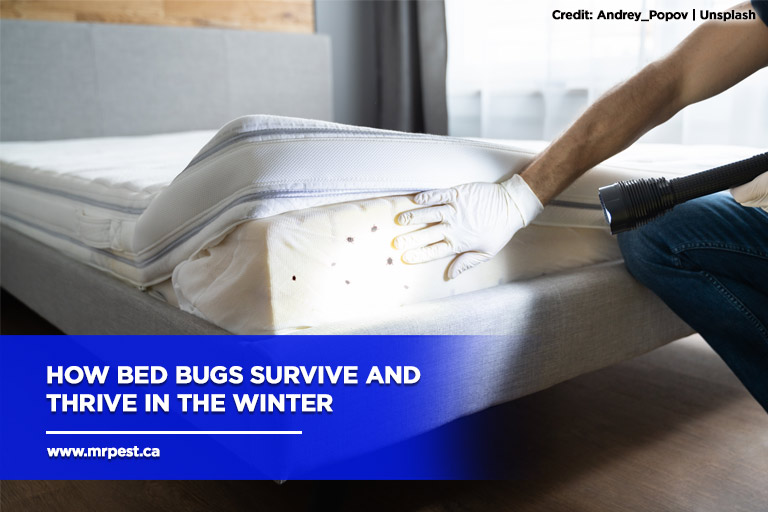The winter season can bring bone-chilling temperatures. Surely, enduring the severe cold would result in a decrease in the number of bed bugs, right? Certainly not! These tenacious vermin are more resilient than you may realize. They have found methods to adapt to unfavourable conditions, making it more challenging to eradicate them. The effects of winter on bed bug infestations are examined in greater detail.
Do Bed Bugs Go Away in the Winter?
Unfortunately, the answer is “no”. Bed bugs do not disappear during the winter. Insects hibernate differently than animals. The majority of bugs and insects enter a low-energy state known as “diapause” during the winter, pausing their development until they are ready to become active again when the mild weather returns. While many irritating summer insects such as gnats, flies, and mosquitoes tend to disappear during the winter due to the cold weather, bed bugs are an exception.
In most instances, bed bugs thrive inside a home regardless of the outdoor temperature. They can be quite active during the winter, particularly if you keep your home warm to combat the weather.
Although bed bugs prefer relatively mild temperatures, they can endure cold temperatures for protracted periods. To kill bed bugs at temperatures below the freezing point, they must typically be exposed to the weather for approximately four days.
Are Bed Bugs More Active in Summer or Winter?
Male and female bed bugs are equally active during the summer and winter. Bed bugs are typically found indoors, where the temperature is typically regulated. We only observe an increase in bed bug cases during the summer and autumn, when more people are on the road.
Bed bugs are more likely to infest a hotel, Airbnb, airplane cabin, Uber/Lyft, or theatre if you are travelling. The bed bugs will reproduce and bite the same regardless of the season.
What are The Signs of a Bed Bug Infestation?

Here are some early warning signs to look out for:
- Bites on Your Skin
Bed bugs must consume food, straightforward. And unfortunately, you are the primary course. Bed bug bites will manifest as small, occasionally itchy, red welts on the skin. Now, many insects can strike you during the night, but if you have three or four welts in a row, you are likely bitten by bed bugs.
Various individuals will react differently to bed bug bites. Some individuals may be oblivious to the welts, while others may find them irritating. Some severe reactions to bed bug bites include hives or an allergic reaction in general.
- Red/Rusty Stains
Bloodstains on linens are another early indicator of bed bugs. There are a few possible causes for these stains:
-
- After the bug has bitten you and left, there may still be some blood on your epidermis that has not yet dried. This can rapidly transfer to your sheets.
- You may accidentally crush an insect if you turn or change positions. The blood stain is caused by the bug’s inability to completely digest your blood, which causes it to get on your linens.
- Black Dots
A bed bug infestation that has been going on for some time will typically manifest as black, brown, or reddish-brown spots on your sheets or mattress.
As the infestation expands, these spots appear. They are the result of insect droppings and insect crushing. You may find these spots in a cluster if the infestation is recent, or they may be more dispersed if the infestation has been ongoing for some time.
- Musty Smell Around your Bed
If you begin to observe a musty odour around your mattress that has no apparent source, you may have a bed bug infestation. As the infestation spreads, pheromones will combine with the odour of pulverized insects and their feces to produce an unpleasant odour.
However, among these early indicators, the smell may be the least reliable. Before assuming that this odour is the result of a bed bug infestation, investigate your sleeping environment thoroughly.
- Living Bugs
Unfortunately, the only definitive evidence of a bed bug infestation is the presence of adult bed bugs or their egg cases. As insects progress through their life stages, their shells will likely differ in size. They are the exoskeletons excreted by insects when they moult. If you see casings or a living bug, that is all the evidence you need.
How to Prevent Bed Bug Infestation?

Which home remedies for bed bugs are effective? And what steps can you take to prevent their spread? Here are some ways to prevent bed bug infestation.
- Wash bedding
Washing your bed is an effective method for eliminating bed bugs. The use of heat is an effective method to reduce the number of bed bugs in your home, but it is not a foolproof solution.
- Freezing
Freezing bed bug-infested items is an effective bed bug treatment. The items must be frozen for at least four days at below 0 degrees Fahrenheit. As with most home remedies, it is an effective method for reducing their population.
- Vacuuming
Vacuuming is an effective DIY method for eliminating bed bugs. In contrast to other home remedies, this method can eliminate both adult bed bugs and nymphs, in addition to the eggs. It is essential to empty the vacuum into an outdoor waste can to reduce the likelihood of their return. As with most do-it-yourself pest control methods, vacuuming will not eliminate bed bugs from your residence, but it will help reduce their population.
- Diatomaceous earth
Diatomaceous earth is a natural material composed of the fossilized remains of microscopic aquatic organisms. Use diatomaceous earth to treat infested areas, including fissures, crevices, and baseboards. Wait a few days before vacuuming it up along with the bed bugs that have died.
- Steam Cleaning
Bed bugs cannot tolerate extreme conditions. The use of steam to sanitize your mattress, furniture, and carpets can assist in eliminating bed bugs and their eggs. Ensure that the vapour reaches a temperature of at least 120°F (49°C) and slowly run the steam cleaner over infested areas to guarantee complete coverage.
Control your Bed Bug Infestation Today
You may have noticed that none of the above natural and home pest control treatments to repel bedbugs are foolproof. Therefore, it is always preferable to seek professional pest control when dealing with these creatures. If your natural attempts to repel bed bugs fail, get in touch with Mr. Pest Control. Calling 705-739-7378 is the initial step in eliminating bed bugs from your residence.



